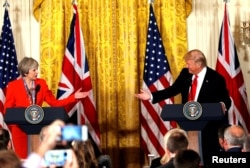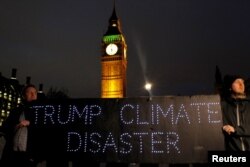Thousands of people took to the streets of London outside Parliament late Monday as British lawmakers debated whether to withdraw an invitation to U.S. President Donald Trump for a state visit.
British Prime Minister Theresa May became the first foreign leader to meet Trump in the White House in January, when she invited him to Britain on a state visit to be hosted by Queen Elizabeth II later this year.
The debate was scheduled after more than 1.8 million people signed an online petition calling on the British government to cancel the state visit. A counter-petition urging the government to support the visit, signed by 300,000, was also being discussed.
Robust debate
Despite the robust debate in parliament, the lawmakers have no power to actually withdraw the offer.
Paul Flynn, a member for the opposition Labor Party, opened the debate calling Trump a man who behaves like a "petulant child," who should have his state visit downgraded to a mere visit.
Outside parliament, protester Benjamin Kari said people needed to stand up against Trump's policies and avoid becoming complacent. "He's promoting racist policies. He's normalizing racism and misogyny and Islamophobia."
May's visit a sign of desperation?
Bryan Richardson, a member of the Stand up to Racism group, said May "humiliated herself by rushing over to Washington to be the first leader to meet Donald Trump."
Some lawmakers said May's haste to bolster the trans-Atlantic "special relationship" as Britain prepares to leave the European Union had an edge of desperation.
"We didn't do this for [President John F.] Kennedy," Labor lawmaker David Lammy said. "We didn't do this for [President Harry S.] Truman. We didn't do this for [President Ronald] Reagan. But for this man, after seven days, we say 'Please come and we will lay on everything because we are so desperate for your company?' … I am ashamed that it has come to this."
Visit will happen
The government insists Trump's visit will take place, though dates have not been announced. Conservative lawmakers said revoking the invitation would be a bad idea for the trans-Atlantic relationship.
"We believe it is absolutely right that we should use all the tools at our disposal to build common ground with President Trump," Foreign Office Minister Alan Duncan told lawmakers.
"The visit should happen, the visit will happen," he added. "And when it does, I trust the United Kingdom will extend a polite and generous welcome to President Donald Trump."







